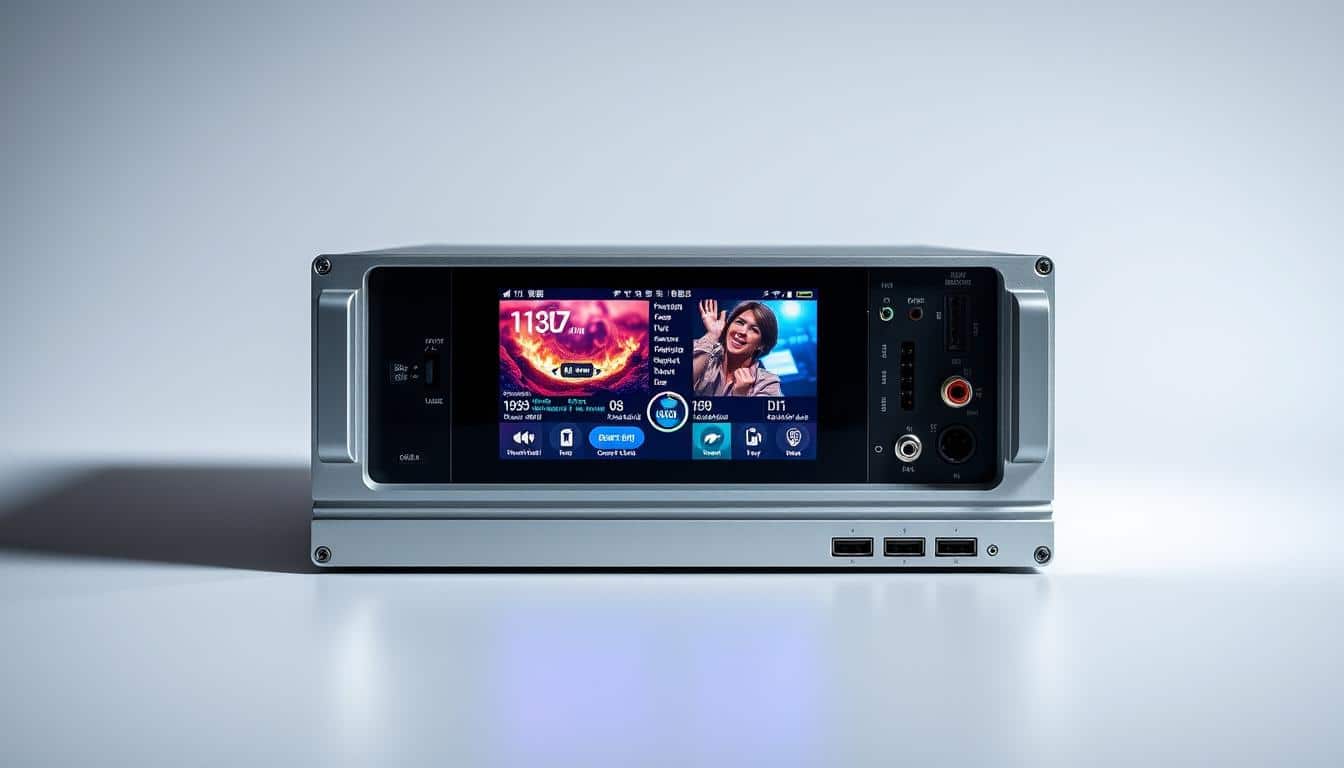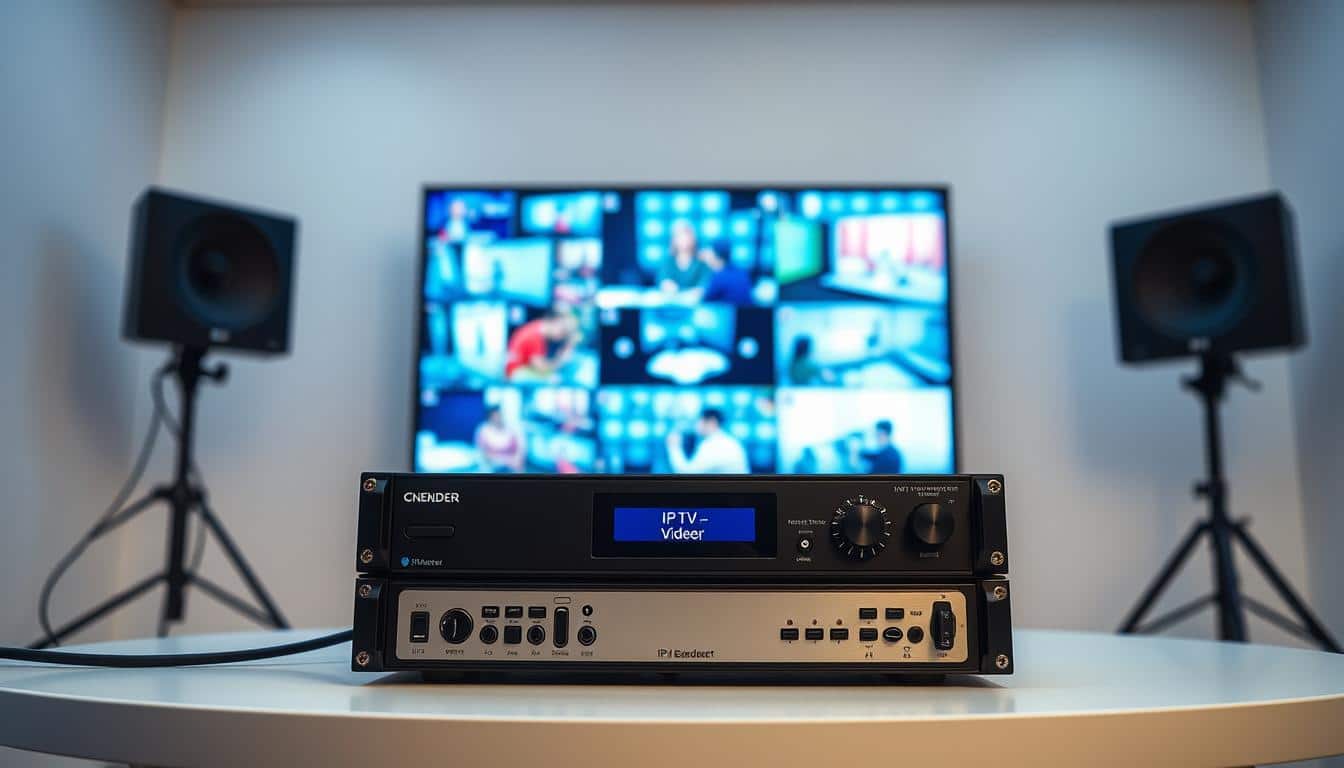Are you struggling to achieve high-quality video streaming despite having a robust internet connection? The secret to seamless streaming lies in the right equipment, particularly the IPTV encoder.
A good video streaming solution relies heavily on the encoder’s ability to compress and transmit video content efficiently. With the increasing demand for online streaming, understanding the role of an IPTV encoder is crucial for content providers and streamers alike.

Choosing the best IPTV encoder can be daunting, given the numerous options available. However, the right choice can significantly enhance your streaming quality and reliability.
Table of Contents
Key Takeaways
- Understanding the importance of IPTV encoders in modern streaming.
- Factors to consider when selecting an IPTV encoder.
- The impact of a good IPTV on streaming quality.
- Popular IPTV options for different streaming needs.
- Tips for optimizing your streaming setup with the right IPTV.
What Is an IPTV Encoder and Why Do You Need One?
Understanding IPTV encoders is key to unlocking superior streaming experiences. An IPTV is a critical component in the video streaming workflow, responsible for converting raw video and audio signals into a digital format that can be streamed over the internet.
Definition and Basic Functions
An IPTV encoder, also known as a broadcast encoder, is a hardware or software solution that encodes raw video and audio into a compressed digital format. This process involves live video encoding, where the encoder captures the source signal, compresses it, and prepares it for streaming.

The Critical Role in Video Streaming Workflows
In video streaming workflows, IPTV encoders play a crucial role by ensuring that the video content is properly encoded for distribution. They enable content providers to deliver high-quality streams to their audience, regardless of the viewer’s device or internet connection.
By efficiently encoding video content, IPTV encoders help reduce latency and improve the overall viewer experience. This makes them an essential tool for anyone involved in streaming, from broadcasters to content creators.
How IPTV Encoders Transform Your Content
IPTV encoders play a crucial role in transforming raw video content into a format that can be streamed efficiently. This transformation is made possible through advanced video compression technology, which reduces the size of video files while maintaining their quality.

The Technical Process of Video Encoding
Video encoding involves converting raw video signals into a digital format that can be compressed and streamed. This process is handled by the streaming hardware within IPTV encoders, which can include dedicated hardware or software solutions.
As noted by a leading industry expert, “The efficiency of video encoding directly impacts the quality of the streaming experience.”
“The right encoder can make all the difference in delivering high-quality video content to your audience.”
Converting Source Signals to Streamable Formats
The IPTV takes the source signal, whether it’s from a camera, a file, or another input, and converts it into various streamable formats. This conversion enables content to be delivered across different platforms and devices, ensuring a broad reach.
By leveraging the latest video compression technology, IPTV encoders can significantly reduce buffering and improve video quality, even on limited bandwidth connections.
Key Benefits of Implementing a Professional IPTV
The benefits of using a professional IPTV are multifaceted, improving both video quality and operational efficiency. By investing in a high-quality encoder, content creators can significantly enhance their streaming operations.
Superior Video Quality and Viewer Experience
A professional IPTV encoder ensures superior video quality by utilizing advanced video encoding software. This results in a better viewing experience for the audience, with clearer images and smoother playback.

Efficient Bandwidth Management
Efficient bandwidth management is another key advantage. By supporting multi-bitrate streaming, a professional IPTV allows for adaptive bitrate technology, ensuring that viewers receive the best possible quality based on their internet connection.
Multi-Platform Delivery Capabilities
Furthermore, professional IPTV encoders enable multi-platform delivery, allowing content to be streamed across various devices and platforms. This flexibility is crucial in today’s diverse viewing landscape.
In conclusion, implementing a professional IPTV encoder offers numerous benefits, from enhanced video quality to efficient bandwidth management and multi-platform delivery capabilities. These advantages not only improve the viewer’s experience but also streamline the streamer’s operations.
Types of IPTV Encoders for Different Streaming Needs
Different streaming needs demand different IPTV solutions, ranging from hardware to cloud-based options. The choice of encoder depends on factors such as the scale of operation, budget, and specific streaming requirements.
Hardware-Based Encoding Systems
Hardware-based IPTV encoders are dedicated devices designed for high-performance encoding. They offer reliable and consistent performance, making them suitable for professional broadcasting environments.
- Advantages: High-quality encoding, low latency, and robust performance.
- Disadvantages: Higher upfront costs, less flexibility compared to software solutions.
Software Encoding Solutions
Software IPTV encoders run on standard computer hardware, offering flexibility and scalability. They are ideal for content creators who need to encode video on various devices.
- OBS Studio: A popular open-source option for streaming and recording.
- Telestream Wirecast: Professional software for live production and streaming.
Hybrid and Cloud-Based Options
Hybrid and cloud-based IPTV encoders combine the benefits of hardware and software solutions, offering scalability and flexibility. They are particularly useful for large-scale streaming operations.
AWS Elemental MediaLive is a cloud-based encoding service that provides scalable and reliable encoding capabilities.
“Cloud-based encoding solutions are revolutionizing the way we approach IPTV streaming, offering unprecedented scalability and flexibility.”
AWS Elemental
Essential Features to Consider When Choosing an IPTV Encoder
With numerous IPTV encoders available, identifying the essential features is vital for optimal live video encoding. When selecting an IPTV encoder, several key factors come into play to ensure you achieve the best possible video streaming solutions.
Video Codec Support (H.264, H.265/HEVC, AV1)
The choice of video codec is critical for efficient compression and high-quality video. Modern IPTV encoders should support advanced codecs like H.265/HEVC and AV1, which offer better compression rates than the older H.264 standard. This support ensures compatibility with a wide range of devices and platforms.
Resolution and Frame Rate Capabilities
The ability to handle various resolutions and frame rates is essential for delivering smooth video content. Look for an IPTV encoder that can handle 4K resolutions and high frame rates to future-proof your streaming capabilities.
Adaptive Bitrate Technology
Adaptive Bitrate Streaming is a crucial feature that adjusts video quality in real-time based on the viewer’s internet connection. This technology ensures a seamless viewing experience by preventing buffering and reducing latency.
Input/Output Connectivity Options
The IPTV encoder’s input/output options are vital for integrating with your existing equipment. Ensure the encoder has the necessary ports (HDMI, SDI, etc.) to connect your sources and supports the required output formats for your streaming needs.
By considering these essential features, you can choose an IPTV encoder that meets your specific requirements for live video encoding and delivers high-quality video streaming solutions.
Top Hardware IPTV Encoders for Professional Broadcasting
For broadcasters seeking top-tier streaming quality, the right IPTV encoder is crucial. Hardware IPTV encoders are particularly valued in professional broadcasting for their reliability, performance, and flexibility.
Haivision Makito X4: Enterprise-Grade Performance
The Haivision Makito X4 is renowned for its enterprise-grade performance, offering high-quality video encoding and streaming capabilities. It supports a wide range of codecs, including H.264 and H.265/HEVC, ensuring efficient bandwidth usage without compromising on video quality.
Teradek Vidiu Pro: Portable Broadcasting Power
The Teradek Vidiu Pro is a portable and powerful IPTV encoder designed for broadcasters who need reliable streaming on the go. Its compact design and robust feature set make it ideal for live events and remote broadcasting.
Blackmagic Design Web Presenter HD: Budget-Friendly Quality
For those looking for a more budget-friendly option without sacrificing quality, the Blackmagic Design Web Presenter HD is an excellent choice. It offers high-definition streaming capabilities at an affordable price, making it suitable for smaller-scale broadcasting operations.
When choosing a hardware IPTV encoder, several factors should be considered, including video codec support, resolution and frame rate capabilities, and input/output connectivity options. The following table compares the key features of the three encoders discussed:
| Feature | Haivision Makito X4 | Teradek Vidiu Pro | Blackmagic Design Web Presenter HD |
|---|---|---|---|
| Codec Support | H.264, H.265/HEVC | H.264 | H.264 |
| Max Resolution | 4Kp60 | 1080p60 | 1080p60 |
| Input/Output Options | HDMI, SDI | HDMI, SDI | HDMI |
By considering these factors and comparing the features of different hardware IPTV encoders, broadcasters can make informed decisions that meet their specific streaming needs.
Best Software IPTV Encoder Solutions for Content Creators
With the rise of online content, the importance of robust IPTV encoder software cannot be overstated for creators aiming for excellence. As the demand for high-quality video content continues to grow, content creators are turning to sophisticated software solutions to meet their streaming needs.
The right IPTV encoder software can make a significant difference in the quality of the stream, the ease of production, and the overall viewer experience. Let’s explore some of the top software IPTV encoder solutions available to content creators today.
OBS Studio: The Open-Source Powerhouse
OBS Studio is a popular open-source software that has gained widespread acceptance among content creators. Its versatility and range of features make it an ideal choice for live streaming and video production. Key features include:
- Multi-platform support
- Real-time video and audio mixing
- Extensive plugin library for added functionality
OBS Studio’s flexibility and customizability have made it a favorite among both novice and experienced creators. Its ability to handle complex scenes and multiple audio sources seamlessly is particularly noteworthy.
Telestream Wirecast: Professional Production Tools
Telestream Wirecast is another highly regarded IPTV encoder software that offers professional-grade features for live production. It is designed to cater to the needs of serious content creators who require advanced tools for their streaming operations. Notable features include:
- Multi-camera support
- Chroma keying and title overlays
- Integration with various streaming platforms
Wirecast’s intuitive interface and powerful production capabilities make it an excellent choice for those looking to elevate their live streaming quality.
vMix: Scalable Live Production Software
vMix is a comprehensive live video production software that is compatible with Windows platforms. It offers a wide range of features that cater to the diverse needs of content creators, from simple streaming setups to complex multi-camera productions. Key highlights include:
- Support for up to 4K video
- Multi-camera editing and switching
- Built-in streaming and recording capabilities
vMix’s scalability and feature-rich environment make it a compelling option for content creators looking for a reliable and versatile IPTV encoder software solution.
In conclusion, the choice of IPTV encoder software depends on the specific needs and goals of the content creator. OBS Studio, Telestream Wirecast, and vMix are all strong contenders in the market, each offering unique features and capabilities that can enhance the streaming experience.
Cloud-Based IPTV Encoder Services for Scalable Operations
Cloud-based IPTV encoder services are revolutionizing the way streaming operations are managed, offering scalability and flexibility. As the demand for high-quality video content continues to grow, these services provide content providers with the tools they need to efficiently manage their streaming workflows.
AWS Elemental MediaLive: Enterprise Scalability
AWS Elemental MediaLive is a cloud-based video encoding service that offers enterprise-grade scalability and reliability. It supports a wide range of video codecs, including H.264 and H.265/HEVC, ensuring that content providers can deliver high-quality video to their audiences. With its robust features and scalability, MediaLive is an ideal choice for large-scale streaming operations.
Wowza Streaming Cloud: User-Friendly Interface
Wowza Streaming Cloud is another popular cloud-based IPTV encoder service known for its user-friendly interface and robust streaming capabilities. It offers real-time analytics and monitoring, allowing content providers to optimize their streaming workflows. Wowza Streaming Cloud supports various streaming protocols, making it a versatile solution for different streaming needs.
IBM Cloud Video: Robust Security Features
IBM Cloud Video provides a secure and reliable cloud-based IPTV encoding solution with robust security features. It offers advanced encryption and DRM support, ensuring that content is protected throughout the streaming process. IBM Cloud Video is designed to meet the needs of large enterprises and content providers who require a high level of security for their streaming operations.
When choosing a cloud-based IPTV encoder service, content providers should consider factors such as scalability, video quality, and security features. By selecting the right service, providers can ensure a seamless and high-quality streaming experience for their audiences.
Video Compression Technology in Modern IPTV Encoders
The backbone of any IPTV encoder is its video compression technology, which enables efficient and high-quality video transmission. This technology is crucial for reducing the size of video files while maintaining their quality, making it possible to stream content smoothly over various internet connections.
Understanding Compression Algorithms
Compression algorithms are at the heart of video compression technology. These algorithms use complex mathematical formulas to reduce the amount of data required to represent a video image. By doing so, they enable multi-bitrate streaming, which is essential for adapting video quality to different network conditions.
Balancing Quality and File Size
One of the key challenges in video compression is balancing quality and file size. Advanced IPTV encoders achieve this balance by using sophisticated compression techniques that minimize file size without compromising video quality. This is particularly important for delivering high-definition content.
Next-Generation Codecs and Their Advantages
Next-generation codecs, such as H.265/HEVC and AV1, offer significant advantages over their predecessors. They provide better compression efficiency, which means higher quality video at lower bitrates. This results in a better viewer experience and more efficient bandwidth usage.
In conclusion, video compression technology is a vital component of modern IPTV encoders, enabling the delivery of high-quality video content over the internet. By understanding and leveraging this technology, content providers can ensure a superior viewing experience for their audiences.
Setting Up Your IPTV Encoder: Step-by-Step Configuration
Setting up your IPTV encoder correctly is essential for a seamless streaming experience. This process involves several key steps that ensure your encoder is properly configured to deliver high-quality video content.
Initial Hardware and Software Setup
The first step in configuring your IPTV encoder is to complete the initial hardware and software setup. This involves connecting your encoder to your video source, such as a camera or video playback device, and ensuring that all necessary cables are securely attached. For software-based encoders, you’ll need to download and install the encoding software on your computer or server.
According to a study by Grand View Research, the global IPTV market size was valued at USD 63.95 billion in 2020 and is expected to grow at a compound annual growth rate (CAGR) of 15.4% from 2021 to 2028.
“The increasing demand for high-quality video content is driving the adoption of IPTV encoders.”
Optimizing Encoding Parameters
Once your encoder is set up, you’ll need to optimize the encoding parameters for your specific streaming needs. This includes selecting the appropriate video codec, such as H.264 or H.265/HEVC, setting the resolution and frame rate, and configuring bitrate control.
| Parameter | Description | Recommended Setting |
|---|---|---|
| Video Codec | Compression algorithm used for video | H.264 or H.265/HEVC |
| Resolution | Video resolution in pixels | 1080p or 4K |
| Frame Rate | Number of frames per second | 30fps or 60fps |
Testing and Quality Assurance Procedures
After configuring your encoder, it’s crucial to perform thorough testing and quality assurance procedures. This involves streaming test content and monitoring the video quality, checking for any artifacts or errors, and ensuring that the stream is stable and reliable.
By following these steps, you can ensure that your IPTV encoder is properly configured to deliver high-quality video content to your audience.
Industry-Specific Applications of IPTV Encoders
As the demand for live video encoding and broadcast encoder solutions grows, IPTV encoders are being adopted across multiple sectors. Their versatility and advanced technology make them indispensable for various industries, including media and entertainment, corporate communications, and live events.
Media and Entertainment Broadcasting
In the media and entertainment industry, IPTV encoders play a crucial role in delivering high-quality content to audiences worldwide. They enable broadcasters to stream live events, such as sports and news, with minimal latency and superior video quality.
The use of IPTV encoders in this sector is characterized by the need for robust, reliable equipment that can handle demanding encoding tasks. For instance, Haivision Makito X4 and Teradek Vidiu Pro are popular choices among broadcasters due to their enterprise-grade performance and portable broadcasting capabilities.
Corporate and Educational Streaming
Corporate and educational institutions utilize IPTV encoders for internal communications, training sessions, and virtual events. These encoders facilitate the streaming of high-definition video content, enhancing the engagement and reach of corporate and educational programs.
Software solutions like OBS Studio and vMix are favored in this sector for their scalability, flexibility, and cost-effectiveness. They allow organizations to customize their streaming setups according to specific needs, including input/output connectivity options and adaptive bitrate technology.
Live Events and Sports Production
The live events and sports production industry relies heavily on IPTV encoders to broadcast events to global audiences. These encoders are essential for converting source signals into streamable formats that can be distributed across various platforms.
| Industry | Key Requirements | Popular IPTV Encoder Solutions |
|---|---|---|
| Media and Entertainment | High-quality video, low latency | Haivision Makito X4, Teradek Vidiu Pro |
| Corporate and Education | Scalability, customization | OBS Studio, vMix |
| Live Events and Sports | Reliability, real-time encoding | AWS Elemental MediaLive, IBM Cloud Video |
By understanding the specific needs of different industries, IPTV encoder manufacturers can tailor their products to meet the unique demands of each sector, thereby enhancing the overall quality and efficiency of video streaming services.
Conclusion: Selecting the Ideal IPTV Encoder for Your Streaming Goals
Choosing the right IPTV encoder is crucial for delivering high-quality video streaming solutions. With various options available, from hardware-based encoding systems to cloud-based services, the selection process can be daunting.
When evaluating IPTV encoders, consider factors such as video codec support, resolution, and adaptive bitrate technology to ensure optimal video quality and viewer experience. Assess your specific streaming needs, whether for professional broadcasting, corporate events, or live sports production.
Leading brands like Haivision, Teradek, and Blackmagic Design offer reliable hardware IPTV encoders, while software solutions like OBS Studio and Telestream Wirecast provide flexibility. Cloud-based services, including AWS Elemental MediaLive and Wowza Streaming Cloud, offer scalable video streaming solutions.
By understanding your streaming goals and evaluating the features and benefits of different IPTV encoders, you can make an informed decision and select the ideal solution for your needs.
FAQ
What is an IPTV encoder, and how does it work?
An IPTV encoder is a device or software that converts video and audio signals into a digital format suitable for streaming over the internet. It works by compressing the video and audio data using various codecs, such as H.264 or H.265, and then packaging it into a format that can be streamed to various devices.
What are the benefits of using a professional IPTV encoder?
Using a professional IPTV encoder provides several benefits, including superior video quality, efficient bandwidth management, and the ability to deliver content across multiple platforms. It also enables features like multi-bitrate streaming, adaptive bitrate technology, and robust security features.
What are the different types of IPTV encoders available?
There are several types of IPTV encoders available, including hardware-based encoding systems, software encoding solutions, and hybrid or cloud-based options. Each type has its advantages and is suited for different streaming needs, such as professional broadcasting, content creation, or corporate streaming.
How do I choose the right IPTV encoder for my streaming needs?
To choose the right IPTV encoder, consider factors like video codec support, resolution and frame rate capabilities, adaptive bitrate technology, and input/output connectivity options. You should also evaluate your specific streaming requirements, such as the number of streams, content type, and target audience.
What is video compression technology, and how does it work in IPTV encoders?
Video compression technology reduces the size of video files while maintaining their quality. In IPTV encoders, compression algorithms like H.264 and H.265 are used to compress video data, making it possible to stream high-quality video over the internet. The goal is to balance quality and file size to ensure smooth streaming.
Can I use an IPTV encoder for live events and sports production?
Yes, IPTV encoders are commonly used for live events and sports production. They provide the necessary features, such as low latency, high-quality video, and multi-platform delivery, to ensure a professional streaming experience.
What are the advantages of cloud-based IPTV encoder services?
Cloud-based IPTV encoder services offer scalability, flexibility, and reliability, making them ideal for streaming operations that require high availability and adaptability. They also provide features like automated encoding, content protection, and analytics.
How do I set up and configure my IPTV encoder?
Setting up an IPTV encoder involves initial hardware and software setup, optimizing encoding parameters, and testing and quality assurance procedures. The specific steps may vary depending on the type of encoder and your streaming requirements.

